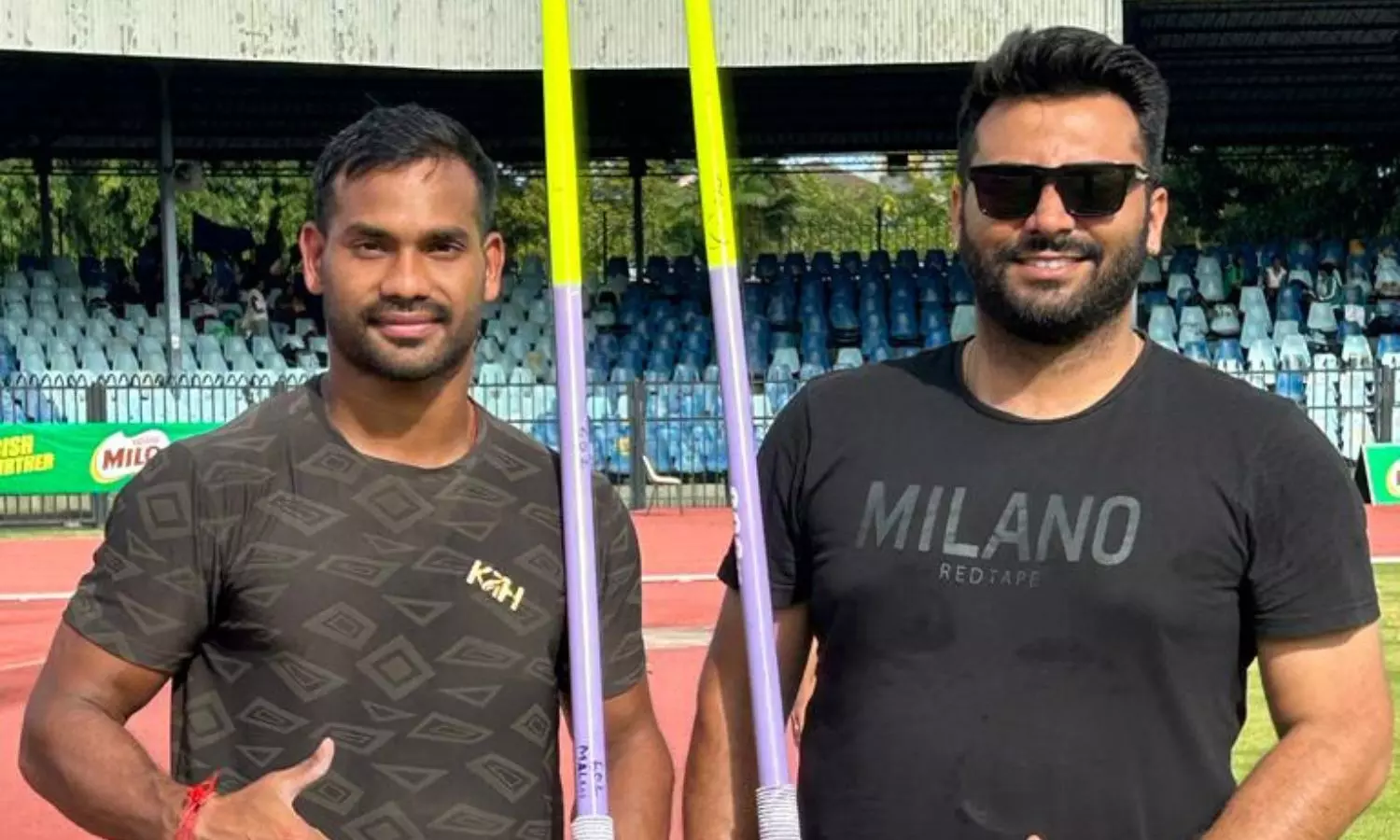Athletics
Meet Samarjeet Singh Malhi, the coach who has ignited javelin throw’s silent revolution
Samarjeet Singh Malhi, the coach of Kishore Kumar Jena, with an unwavering commitment to javelin throw, established an academy on his own land to produce the next generation of Indian throwers.

Javelin thrower Kishore Kumar Jena with his coach Samarjeet Singh Malhi.
As the curtains fell on the men's javelin throw event at the Tokyo Olympics with the final throw, Neeraj Chopra marked a historic entry into the record books. He became the first Indian track and field athlete ever to win the Olympic gold medal.
This juncture signified a turning point for the Indian javelin throw. Neeraj’s feat brought a wave of revolution in javelin throw in the nook and corner of the country.
By securing the historic feat, Neeraj not only achieved athletic glory but also captured the admiration of a billion-plus nation, resonating profoundly with the collective heartbeat of the nation.
India showcased its dominance in javelin throw at the World Championships too, with Neeraj notching up another incredible feat by winning the country’s first-ever gold medal at the prestigious event, while his fellow countrymen Kishore Kumar Jena and DP Manu made fifth and sixth place finishes.
In the Asian Games in Hangzhou, the domination of Indian javelin throwers in the continental showpiece was absolute as Neeraj Chopra and Kishore Kumar Jena clinched the first and second positions. It was Neeraj’s second successive Asian Games gold.
Samarjeet Singh Malhi, the coach of Kishore Kumar Jena and Shivpal Singh, attributed the noticeable shift in javelin throw in India to various aspects.
He, in an exclusive interview with The Bridge, emphasised that India’s rise in the sport is due to a substantial increase in the availability of javelins in the country, and the focus on providing scientific training to athletes which turned out to be a boon.
The Athletics Federation of India (AFI), serving as the central authority for overseeing athletics in the country and holding affiliations with the IAAF, AAA, and the Indian Olympic Association, also plays a pivotal role in the administration of javelin throw in India. It also acted as a spur to the progress of the javelin throw.
Hailing AFI’s effort, coach Malhi said his coaching journey was spurred by encouragement from the federation.
He highlighted the contrast by mentioning that, in the current scenario, they possess around 50-60 javelins, each costing approximately Rs 1 lakh, a marked difference from the conditions during his own days of practising javelin throw.
Unwavering commitment to javelin throw
With an unwavering commitment to javelin throw, Malhi demonstrated resilience amid the challenges posed by the COVID-19 pandemic.
The crisis also opened a new window of development, with him establishing an academy named after his late mother, Surendar Kaul Malhi, in Ramsinghpur, Rajasthan.
Emphasizing that the genuine talent for javelin throwing often originates from rural India, Malhi said, "I worked on the grassroots level, starting from my village Ramsinghpur, and had over 70 kids."
Undeterred by scepticism, he inaugurated the academy on his personal land, constructing a track fuelled by encouragement from his sports enthusiast father.
The initiative attracted aspiring young talents from diverse corners of India, including Uttar Pradesh, Punjab, and southern regions. Coach
Malhi's efforts yielded tangible results, as many of these enthusiastic youngsters such as Vivek Kumar and Sachin Yadav progressed to compete at the national level.
Reflecting on the sport's unique allure, he remarked, "No one knew what javelin was exactly, but buses used to stop, and people got down just to watch how this sport was because it’s so interesting."
The science behind the ascent of Indian javelin
Through grassroots initiatives spearheaded by passionate individuals like coach Malhi, the trajectory of the javelin throw in India has experienced a notable ascent, captivating audiences nationwide with its compelling narrative and undeniable charm.
When queried about the technical intricacies of the sport, the coach, in drawing parallels with sports requiring hand-eye coordination or motor skills, underscored the paramount importance of an athlete's rhythm.
According to Malhi, specific exercises tailored for javelin throw play a crucial role. Additionally, factors such as the angle of attack and the thrower's withdrawal, considering the lightweight nature of the javelin, demand a delicate balance to ensure precision and effective execution.
When asked about the distinguishing factors that elevate Indian javelin throwers like Neeraj Chopra and Kishore Kumar Jena to global success, Malhi credited the transformation to enhanced diets and collective efforts within the ecosystem.
Drawing from his close work with Jena, he delved into technicalities, pinpointing the game-changer as the shift in Jena's grip, knee position, and the arch he now creates. From initially reaching the 75m mark, Jena has progressed to consistently throwing distances exceeding 85m, showcasing the tangible impact of these refined techniques.
Malhi is also adamant that Neeraj Chopra's meteoric rise and popularity have transcended the realm of javelin throw, making the sport universally recognised.
He remarked, "He's brought recognition to the game, and we no longer have to explain what javelin throw is."
Highlighting the historical significance of Neeraj's achievements, Malhi stated, "What Neeraj did was make history, and what Jena did was answer the question of who comes after Neeraj."
Coach Malhi sees Neeraj's success as a catalyst that opened doors for others, with Kishore Jena further contributing to the sport's prominence.
He expressed confidence that each new addition to the javelin community will continue to build on this momentum. While celebrating Neeraj's success, Malhi emphasised the significance of Jena's achievements, considering him a testament to the Indian system—a complete product of Indian coaching, and Indian diets, reflecting the remarkable ascent of the Indian javelin system.
